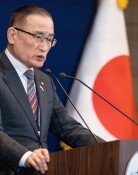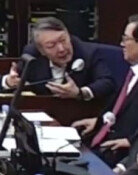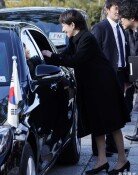[Opinion] Maritime Power Theory of Taiwan
[Opinion] Maritime Power Theory of Taiwan
Posted September. 30, 2004 22:20,
Taiwan President Chen Shui-bian of the Democratic Progressive Party succeeded to keep his office in the March election with his negative campaign strategy stimulating regional sentiment among ben shen ren (natives) and wai shen ren (new comers). He insisted, Supporting the Nationalist Party, which is a foreign power, is the same as selling Taiwan to China. Ben shen ren should be united to stop this. Distinguishing between ben shen ren and wai shen ren originated from Zheng Cheng-gong (1624~1662) during the Ming Dynasty. Those who followed him and settled in Taiwan some 350 years ago are considered as ben shen ren, and those who came to Taiwan with Chiang Kai-shek, former leader of the Nationalist Party, in 1949 are wai shen ren.
Zheng Cheng-gong is famous for his resistance activities in areas such as Jinmen and Fujian against the Ching Dynasty when the Ming Dynasty was destroyed in 1644. He succeeded at one time in capturing Nanjing, but Ching attacked him back and he had to retrieve from Nanjing and move his base to Taiwan. He drove the Netherlands, which was controlling Taiwan at that time, out and liberated the island. He even had a grand plan to extend Taiwans power into the Philippines. However, he died young at the age of 38.
Peng Min-min of the Democratic Progressive Party, who ran for presidency in 1996, emphasized, Taiwan is not an edge country, but a maritime power with a dolphin shape that swims energetically in the Pacific. A famous follower of Pengs maritime power nation theory is Vice President Lu Hsiu-lien. She said, Zheng Cheng-gong possessed an unusual spirit of the ocean. He was wise enough to realize that it is not possible to gain the mainland back, so he decided to become Taiwanese, understanding that Taiwan is actually a better place to live than the mainland.
Zheng Cheng-gong had been admired as a symbolic figure for the reclamation of mainland China while the Nationalist Party was in power. He is now transferred as a prophet for the establishment of the maritime power nation under the government of the Democratic Progressive Party that supports the Taiwans independency from China. The Taiwan Government Information Office announced on September 15 a reform plan of the current government structures to downsize the Mainland Affairs Council (MAC) significantly and to set up a new committee for its maritime power policy. The MAC has been in charge of Taiwan-Mainland unification policies. It is a demonstration of the will to make a Zheng Cheng-gong version government of ambition to give up the reclamation of the mainland and instead to expand into the ocean. Despite of Chinas threat, Taiwan is broadening its distance with China through a new interpretation about Zheng Cheng-gong, the front fighter to reclaim the mainland.
Hwang Yoo-seong, Beijing correspondent, yshwang@donga.com







